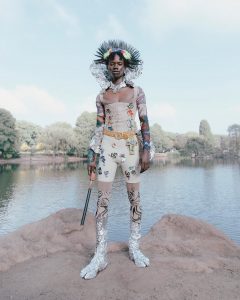Cloaked in swathes of cloth. Drenched in darkness. Morphous forms are interrupted only by protruding horns that peer from beneath the surface. Rendered scenes of botanical backgrounds create a space in which looking, operates as an act of violence and refusing to be seen, one of resistance.
Kiluanji Kia Henda’s solo exhibition at the Cape Town branch of Goodman Gallery, In the Days of a Dark Safari explores the homogenised imagery and damaging narratives of imagined-Africa, constructed during the colonial era by the European invader-oppressor. His work also navigates the complexities of performative voyeurism – as a mode of enacting systems of dehumanising violence onto the ‘other’.
“Since parallel lines only meet at infinity, so do colonialism and populism meet in neo-colonialism. Both forge artificial images of nature, the hiding place of the state’s violence†This statement by Henda and Lucas Parente in many ways resonates with Achille Mbembe’s text Necropolitics, “the shattering experience of otherness and…the politics of race is ultimately linked to the politics of death.â€
Henda’s images critique the colonial trope of the ‘noble savagery’. Mbembe writes, “In the eyes of the conqueror, savage life is just another form of animal life, a horrifying experience, something alien beyond imagination or comprehension.†Henda’s artistic work around themes of identity, politics, and perceptions of post-colonialism and modernism in Africa constructs an alternative history that aims to disrupt the normalized grand-narrative.
In relation to this particular body of work Henda mentions, “the effort to create a Museum of Natural is a process similar to the creation of hostile narratives from the perspective of the foreigner who colonises by maintaining distance, consigning an entire continent to a Place of Darkness.†In this instance, the museum institutionalises and immortalises an archive of visual iconography under the guise of categorised truths.
The blind consumption of these often didactic presentations of ‘fact’, further reinforce problematic representations. Henda uses humour as a platform to undermine and erode entrenched visual tropes. His series, The Last Journey of the dictator Mussunda N’Zombo Before the Great Extinction is a semi-fictioned account, loosely based on former president Mobutu Sese Seko of the Democratic Republic of the Congo. The series of images articulates the ‘end of dictatorship’, ultimately concluding in a kind of death.
“Politics is therefore death that lives a human life. Such, too, is the definition of absolute knowledge and sovereignty: risking the entirety of one’s life.†– Mbembe
